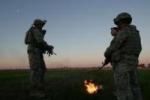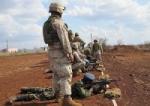
Originally Posted by
tequila

Quite a few assumptions in your own argument.
You presume that our withdrawal would not be interpreted as Western abandonment of Afghanistan. If we withdraw under fire, I wonder how it could be perceived otherwise. This will signal to our current allies that we do not believe their cause to be worth supporting or winnable.
And I consider that signal as weak if not irrelevant. That's the real assumption on my part. Some nations tend to believe that what they do is always important, while it's not. The vital interests of the non-Pashtun people in Northern Afghanistan would not be changed by whatever signals fizzle around.
The Taliban will gain enormous strength in the south and east as any and all of our allies there flip in order to avoid retribution. You assume that Tajiks, Uzbeks, and Hazaras are irretrievably anti-Pashtun and anti-Taliban. Since we are abandoning the Afghan government and people to associated warlords and local power brokers, why do you think these warlords will not make their own backroom deals to survive under a Taliban regime, especially since they are do not represent unified forces while the Taliban does?
Because "we" are merely some players in the game, just like the Taliban are merely a few players in the game. There are enough interests involved to subsidy Northern efforts and to prevent a total victory of the Taliban - without a single Western pair of boots in Afghanistan.
Those in power in the North would lose everything (that isn't in foreign countries yet or portable) if they lost to the Taliban, so they will be willing to keep them at bay.
We saw much of this when the Taliban swept to victory the first time.
...when pretty much nobody cared.
We also saw the same mechanics when the Taliban fell for the first time. A second time would not be much more difficult (yet much cheaper than occupation).
Also, the assertions of the wonders of Russian and foreign support do not strike me as reassuring or particularly useful. The Russians, Indians, etc. supported the Northern Alliance, and that did not prevent the NA from being defeated over and over and penned into the Panjshir.
Their support was flimsy in comparison to what is to be expected in the future.
Without the unifying figure and military ability of Massoud, I doubt what remains of the NA today could put up much real resistance.
Men are replaceable. Someone will rise to the job - or the job will be done decentrally. It's not really important as long as they don't infight too much.
What on earth makes you believe the Taliban would accept a splintered Afghanistan?
What on earth makes you believe that the Taliban are the only ones with a say in this?
In what world does handing over a massive safe area and recruiting base to your enemy improve your chances?
In what world isn't Southern Afghanistan a Taliban recruiting base yet? And who says that it would be any more safe then than now?
They would need to come out of the underground to rule that place, exposing themselves.
A Talibanized south and east Afghanistan creates the exact problem for the Pakistani Army in its fight against the TTP as the FATA poses for us now. It guarantees that the TTP will never be militarily defeated and indeed will be able to return over and over again to contest the FATA and, more worryingly, launch waves of suicide bombers into Pakistani cities.
An undefeatable power has yet to be invented, and I'm helluva sure it won't look like the Taliban.
Besides; the supply of suicide bombers depends on recruiting, not on recruit potential once you have a recruiting base of hundreds of thousands of people with that fertility/mortality rate as they have in Pakistan today.
A far more likely reading of Pakistani Army behavior is that it will recognize the impossible strategic situation and instead flip to appeasement of the TTP and the Taliban. Since we will have proven again to the Pakistani Army that we do not view South Asia as important enough to fight for, what incentive does the PA have to partner with us to fight extremism?
Honestly, I've yet to see a Pakistani source that gives a damn about the U.S.. They only give a damn about your money, not about your policies. It's not the child that looks attentively at the big brother and whether he thinks something is important or cool or not.
The Pakistani Army is a bureaucracy in egoistic mode. They have barely lost (official) political control. Taliban still don't seem to be highly rated as a problem there, which explains their modest morale in facing them. Why should they do it anyway, if foreigners are working on their problem?
Rather go back to the old reliable of using extremism to battle one's own internal enemies (India, Baluch separatists, uppity civilian politicians). In order to do this, the Army will likely launch another coup, since Zardari and the PPP are devoted enemies of the TTP, and continue the Pakistani state down its slow death spiral.
...as if OEF-A would have a significant (and advantageous) influence on internal Pakistani politics.
No, the assumption is that the Taliban and al-Qaeda are two Islamist movements linked by similar worldviews and deep and durable personal connections in a part of the world where those relationships matter. Bin Laden married Mullah Omar's daughter and has sworn personal loyalty to him. For all the blather about a split, who do you think is hosting AQ right now in the FATA and Baluchistan?
That's quite irrelevant to the question of Afghanistan.
AQ has men with brains. They KNOW that a return to pre-01 status in Afghanistan would provoke a new fall of the Taliban. A return is needless, unimportant (because said AQ people already have their safe haven and would find a new one anyway - and if not, a movement can survive by replacing old heads) and it would be utterly stupid.
AQ has greatly harmed the Taliban once - you think they're stupid enough to repeat the same mistake?
Wow, so easy to raise and maintain a warband in Afghanistan. Money solves all problems, don't you know?
Indeed, it's a matter of weeks. Transportation is the greatest delayer.
I think instead that organizations fight wars and the Taliban represents a new sort of organization in Afghanistan --- a religiously based unified movement with a centralized command that is flexible enough to make local alliances but subordinates all under its own direction.
According to my information both "unified" and "centralized command" are 95% wrong and "religiously based" should be understood quite loosely.
It destroyed or absorbed dozens of competing factions in the 1990s and can do so again, including Uzbek and Tajik factions.
...just like the NA did in 2001/2002 and just like it has been done since at least Alexander the Great's invasion (more likely since the Persian invasion that preceded Alexander's rampage). So what?
I also don't know why you would think it would be so easy to magic up the will for another invasion having withdrawn for cost reasons the first time. It'd take another 9/11-style attack to create the political capital for that.












Bookmarks